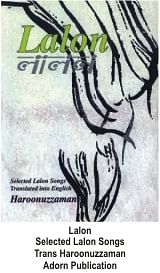The songs of a mystic

There is a certain pleasure in reviewing works on Lalon and his songs. This work on the mystic by Haroonuzzaman is a rare publication. The book only reasserts our feelings of debt to Lalon. His songs have always enriched and nurtured our souls and minds. It is certainly true that Lalon's is one of the most talented and philosophically insightful minds as revealed in oral and textual traditions. He disseminated his ideas in mind-boggling songs, through a remarkable multitude of musical compositions. The main musical instruments ektara and dugdugi for Lalon music are easily found anywhere in Bangladesh, for the culture he upholds defines the quality of life here. Lalon songs are philosophical, contemplative and thought-provoking. The language of the songs is very simple but the essence of the language is very contemplative, powerful and rich. The songs project before us a heavenly and mysterious world.
Lalon's songs are symbolic of ecstasy and adoration. Without love and affection, for the individual as also for divinity, it is rather difficult to think of the nature of existence. And that is where Lalon's songs come in. The songs can easily relate to the soul of man, and they do. They are tranquil, quiet, mind-boggling and based on adoration, confidence, the mystery of life and death and involved in the search for truth. A cardinal lesson emerging from the songs is that in a purposeful life, indeed in love, there cannot be any room for jealousy, distrust, conceit, snobbery and unfairness. Loving humankind and feeling empathy, delight, liberty and setting out on a search for truth and beauty are the main aspects of Lalon songs. The subject matter, the themes of his songs run the entire gamut from the ideological to the practical to the radical to the metaphysical. They hold out the truth that the most important aspects of religion are not based on blind, reflexive practice, but rather on arriving at spiritual enlightenment through a questioning, reflexive process.
Lalon's music has inspired generations of bauls and common folk who have been drawn to its universal message of unity and self-exploration. Lalon intentionally kept his place of birth and the identity of his parents unknown. Around the age of sixteen, he was found floating by the bank of the Kaliganga river, suffering from smallpox. He was taken to the home of Seraj Shah and his wife Matijan, who brought him up. Through a lifetime of mysticism, Lalon composed numerous songs and poems which underscore his philosophy. Among his favorite songs are khhachar bhitor auchin pakhi, jat gelo jat gelo bole, dekhna mon jhokmariay duniyadari, paare loye jao amay, milon hobe koto dine, aar amare marishne maa, and tin pagoler holo mela.
Haroonuzzaman does a creditable job here with Lalon. His translated works have been highly acclaimed because he has created a new dimension and quality in his approach to those he has undertaken to present in translation. He has translated thirty three songs from Bengali to English. All the songs are very popular and well known and so add substance to the selection. In his translation, he has taken the songs from the book 'Moromi Kobi Lalon Shah: Life and Songs' by Dr. Khondokar Riazul Huq and put the songs under different categories, as the writer has done. Attempts have been made to translate into English some selected songs of Allahtotto, Rasultotto, Sristitotto, Murshidtotto, Attototto, Dehototto, Manushtotto, Montotto, and Poromtotto, Jatitotto, and Parapartotto, Chandtotto, and Rooptotto, with a bit of description about each genre.

 For all latest news, follow The Daily Star's Google News channel.
For all latest news, follow The Daily Star's Google News channel. 



Comments